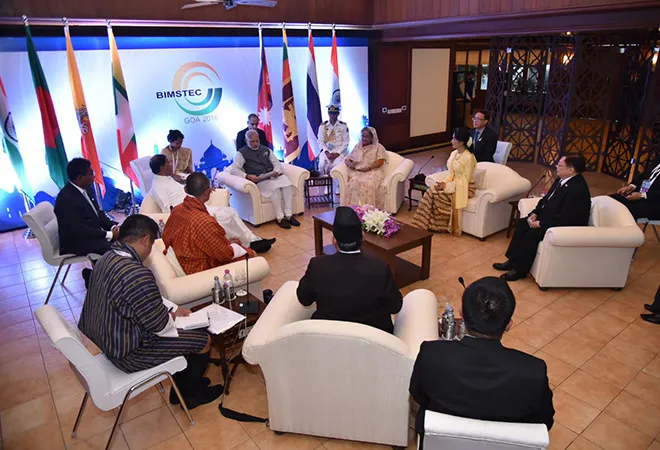-
CENTRES
Progammes & Centres
Location
India is emphasising on promoting economic ties and connectivity in its neighbourhood.

On 1 January 2020, Prime Minister Narendra Modi exchanged New Year greetings on with leaders of neighbouring states except Pakistan. Prime Minister Modi had conversed with leaders of Bangladesh, Nepal, Bhutan, Sri Lanka and Maldives. Although this courtesy calls to South Asian leaders was a goodwill gesture, the move — however — indicated trajectory of India’s neighbourhood policy for 2020, which meant the continuation of the primacy of the Neighbourhood First policy in 2020. The Neighbourhood First policy witnessed some alteration following deterioration of relationship with Pakistan over cross-border terrorism emanating from that country. Pakistan’s reluctance to tame in cross-border terrorism led India to withdraw from the 2016 SAARC summit which was to take place in Pakistan. Regional countries like Bangladesh, Bhutan, Afghanistan, Sri Lanka, Maldives also followed the suit resulting in postponement of the SAARC summit and it remained pending until date. A gist of India’s transformation of the Neighbourhood First policy was witnessed during the BRICS (Brazil, Russia, India, China and South Africa) summit in Goa in 2016. In 2016, India hosted the BIMSTEC, (Bay of Bengal Initiative for Multi Sectoral Technical and Economic Cooperation) outreach summit on the side-lines of BRICS and invited leaders of all member countries. Notably, South Asian countries including Bangladesh, Nepal, Bhutan and Sri Lanka are members in BIMSTEC.
With no major improvement of relationship with Pakistan, India’s approach to neighbourhood has hardly undergone any change. On the contrary tension has escalated between the two countries after India launched a pre-emptive attack in Pakistan’s Kyber Pakhtunkhwa area, in retaliation to the suicide bomb attack on the convoy of the paramilitary forces in Pulwama in February 2019. By inviting leaders of the BIMSTEC countries, for the oath taking ceremony of his second term, Prime Minister Modi had already given a glimpse of his impending foreign policy. Recent telephonic calls suggests his government’s preferences for fostering a relationship with neighbours considered friendly, exception being Pakistan who possesses a hostile attitude towards India.
Greeting leaders of the neighbouring countries added a personal touch to India’s outreach with these countries. It is an effort to strengthen bonds among the leaders of the neighbouring states. Building a personal relationship with these leaders has become crucial because of the emergence of new leadership in some of these countries due to the recently held elections over there. In 2019, elections were held in countries like Sri Lanka and the Maldives followed with a transition of power. Amongst the newly elected leaders while some are considered to maintain a positive attitude towards India like the Maldives. But, some of them have shown certain apprehensions in their outlook towards India and its leadership, this list has Sri Lanka in it. India-Sri Lanka relationship went through a crack during President Mahinda Rajapaksa’s tenure, who is the brother of current Sri Lankan President Gotabaya Rajapaksa. Considering the importance of personal bonding among the leaders in influencing the relationship between the two countries, the present effort is an encouraging step.
India is the largest country in South Asia having two-thirds of the land, population and natural resources. The neighbours are sensitive about their relationship with India due to vast asymmetry and the attached sensitivity of the matter, this also demands a sustained nurturing of relationship with the neighbours. Frequent interaction with these neighbourhood leaders helps to keep the momentum. Again, the present gesture will help in breaking the perception about India not paying adequate attention to its neighbours other than Pakistan. Earlier, the neighbours complained of India not giving adequate attention to them.
Security is preliminary concern for India concerning its relationship with neighbours. Trade and economic relationship with the neighbours can also be not overlooked. Since only 5 per cent of regional trade takes place within the South Asian countries, the component of the trade might not be that critical for India. For the South Asian countries, India is one of their biggest trading partners. The trade and economic relationship created a level of interdependence among the countries that often influence the bilateral relationship.
Presently, India is emphasising on promoting economic ties and connectivity in its neighbourhood. In this regard, India is building various infrastructure projects in its neighbouring countries. India’s engagement with neighbours is seen to be geared to counter China, the neighbour across the Himalayas. China has made substantial inroads into South Asian countries and is emerging as a major trading partner and developing defence relationship in these countries. China’s involvement in the neighbourhood is seen as an effort to dislodge India’s dominance in India’s neighbourhood. Hence, India has some concerns regarding Chinese engagement in these countries. Nevertheless, viewing India’s neighbourhood policy as a response to the engagement of a third country in the region creates unnecessary misunderstanding among its neighbours.
India has the uniqueness of sharing a common culture, history, and language with its neighbours, who look up to India and take inspiration for every sphere of their lives, be it — society, economy, culture, values, etc. This inner bond is difficult to overlook. The present outreach is a remembrance of this innate bond that India shares with its neighbour.
The views expressed above belong to the author(s). ORF research and analyses now available on Telegram! Click here to access our curated content — blogs, longforms and interviews.

Joyeeta Bhattacharjee (1975 2021) was Senior Fellow with ORF. She specialised in Indias neighbourhood policy the eastern arch: Bangladeshs domestic politics and foreign policy: border ...
Read More +